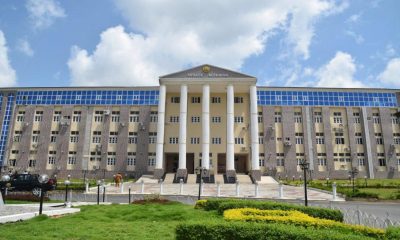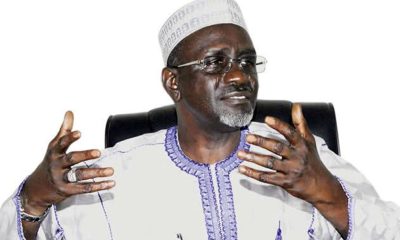metro
Senior student forces JSS 1 scholar to take poisonous soaked Garri in Ebonyi school

It was indeed a case of attempted murder at Government Secondary School, Afikpo, Ebonyi State, when a Junior Secondary School, JSS 1 student, Master Fruitful Onwe, was allegedly forced to drink Garri socked with hypo detergent by one Iroh Chidiebere Bright, an SS2 student of the same school.
It was gathered that the ugly episode was hidden from the school management and parents of the victims, until the bubble busted.
It was gathered that the victim who was rushed to Afikpo Medical Centre after three days, confessed that Iroh Chidiebere Bright, a senior student of SS 2 and House Captain forced him to take the poisonous substance, adding that “he warned me not to reveal to any one either in the School or to his parents at home.”
Narrating his ordeal, the father of the victim and Public Relations Officer, PRO, Ministry of Works and Transport, Mr. Emmanuel Onwe, said the entire episode was painful to him.
“On Friday 20th May, 2022, I received a phone call from the principal telling me that my son was admitted in the hospital. Furiously, I asked him what happened, and he told me that a senior student administered poisonous garri on my son and he became sick.
“I immediately took a trip to Afikpo and met the principal in his office from where he delegated a male teacher who took me to Afikpo Medical Centre where my son was receiving treatment. There I met the vice principal and another woman. The three of them led me to where my son was.
“My heart was so grieved by the sight of my child lying critical ill on the hospital bed but I managed to control myself. The child who administered the poisonous Garri was also there.
“When I asked my son what happened, he narrated before the teachers. He said on Wednesday 18th June, 2022 while he was alone outside the hostel doing manual labour, the senior student who was also the hostel Captain came to him and asked him whether he will drink garri, and he replied him no. But the senior student told him to shut up and take what he has given him and drink immediately.
“My son again summoned courage and told him (the senior student) that he was afraid because he has never given him anything in the past. The senior student then insisted that he must drink the poisoned Garri and warned my son not to repeat the statement. Out of fear, he succumbed to the intimidation and began to drink.
“When my son noticed that the taste was bad, he told the senior student that it had the taste of hypo-jik, but he told him to shut up. At that point my son refused to take more of the poisoned Garri against the senior student’s persuasion. He then took it from him and entered the hostel.
“After about 30 minutes, my son began to have stomach upset and pain in the throat. He quickly went to the senior student and told him his experience. The senior student then gave him palm oil to drink and warned him not to mention what happened to anybody.
“Unfortunately, the problem persisted until Thursday night when my son became very weak and could no longer breathe well. The senior student made arrangement to smuggle him out of the school and send him home. He warned my son not to mention what happened to anyone including me and my wife if he gets home.
“Early in the morning while the senior student with the help of other two senior students were carrying my son on the back to sneak him out of the school, some teachers took notice of what was going on and intercepted them. The senior student and his friends maintained that nothing was wrong with my son but the evidence was already there as my son could not stand on his feet and was as well afraid to open up.
“They maintained their position until out of stiff interrogation of the teachers, another student who had the knowledge of what transpired came and revealed it to the teachers who then rushed my son to the hospital. The issue now is that some people are bent on reversing the culprit’s expulsion from the school since my child didn’t die.”
In a telephone chat, the principal of the school, Mr Ogbonnia Nwachi, stated that the “status of the case as at today, 2nd September, 2022, is that the Secondary Education Board, SEB, Abakaliki, and the Ministry of Education, MOE, have ruled that the boy or culprit remains expelled.
“Nobody is putting pressure on him to be returned. The two institutions have resolved that the boy remains expelled. We are proactive. As I always advise them because I hold regular meetings with them; be kind with one another as no one knows tomorrow.
“The person you are maltreating today because you are his senior could be the person that will help you tomorrow. So, if you are in the habit of maltreating him, and he becomes an eminent person tomorrow, you will not know how to meet him. You will be hiding.
“The best thing is for them to see themselves as brothers instead of this act that I want to show that am a senior. It doesn’t mean anything. Nobody has ever been given an award for being a bully or wicked. I will continue to advise them because for those of us on the field, to manage over 1,000 students from different homes and with different idiosyncrasies are not easy,” he said.
The Chairman of SEB, David Egbu, who explained that the matter was not before his board, called on the two families to make peace.
Meanwhile, the father of culprit, Mr Tony Iroh, advised students to focus on the reason their parents sent them to school and avoid playing with everything.
“I will encourage students to focus on why they were sent to school and not play with everything. If he is recalled, I will feel happy because he has been in the school for a very long time.”
Investigations revealed that some highly placed individuals within the education sector in the state were putting modalities in place to ensure the return of the culprit to the school.
The implication is that if they succeed, the life of the victim will unarguably be in perpetual danger.
This development is presently agitating the minds of students of the school as well as the parent of the victim.
It was also gathered that a woman lawyer (names withheld) in Ebonyi, who claimed that the culprit was a minor, argued that since the victim didn’t die, the culprit should be allowed to return to the school.
-Vanguard
metro
Security operatives stop another pipeline bombing in Rivers

Security operatives stop another pipeline bombing in Rivers
Operatives of the security agencies including the police, Army, Navy and Air Force have foiled an attempt to blow up another pipeline in the Ikwerre and Emohua local government areas of Rivers State.
The police in revealing this bombing attempt on Tuesday however vowed to protect all critical infrastructure of government and ensure total security of lives and property in the state during the emergency rule.
Commissioner of Police in Rivers State, Olugbenga Adepoju, at a press briefing on Tuesday said their joint operations had led to stoping the criminals.
He disclosed that the security team foiled attempts by criminals to take advantage of developments in the state to vandalise critical assets of government.
He added that one suspect died while attempting to detonate an explosive on the pipeline.
He said, “Over the past week, the joint efforts of the security agencies in Rivers State have, among other successes, thwarted attempts by miscreants to vandalise pipelines which led to the death of the vandal in the process of trying to detonate a pipeline at Aluu- Rumuekpe in Ikwerre LGA but for the quick intervention of security agents.”
The CP urged members of the public to provide the Police and other security agencies with credible intelligence regarding individuals or groups and their conspirators engaging in vandalism.
metro
Constitution amendment: Reps move to stop gov’ship election cases at A/Court

Constitution amendment: Reps move to stop gov’ship election cases at A/Court
The House of Representatives on Tuesday passed for second reading, a bill seeking to amend the 1999 Constitution of the Federal Republic of Nigeria to make the Court of Appeal the final arbiter in disputes involving governorship, National and State House of assembly elections.
The bill is among the 39 constitution amendment bills that were passed through second reading on the floor of the House.
The passage of the bills comes as the House prepares to go on Sallah and Easter breaks and on the heels of the controversy that trails the adoption of the declaration of state of emergency declared by President Bola Ahmed Tinubu in Rivers State last week.
The bills were passed after they were presented for second reading through a motion by the House Leader, Rep. Julius Ihonvbre and referred to the House Committee on Constitution Review, chaired by the Deputy Speaker, Benjamin Kalu, for further legislative actions.
The proposed legislation was sponsored by the lawmaker representing Ndokwa East/Ndokwa West/Ukwani Federal Constituency of Delta State, Nnamdi Ezechi.
Daily Trust reports that before now, electoral disputes involving governorship election are decided by the Supreme Court as the final arbiter, while that of the National and State Assemblies end at the Court of Appeal.
However, the proposed amendment seeks to abridge the timeline involved in deciding governorship election disputes by making the Appeal Court the final arbiter.
READ ALSO:
- Atiku says he’s not sure about contesting 2027 presidential election
- Terrorists kill soldiers in attack on Borno military base
- Ex-NSA Dasuki’s N33.2bn fraud case begins afresh 10 years after
Leading the debate on the general principles of the bill, Ezechi said the proposed legislation seeks to alter the provision of sub-section (3) of Section 246 of the 1999 Constitution as amended.
He said the bill seeks to delete the existing subsection (3) and substitute a new subsection (3) to read, “The decisions of the Court of Appeal in respect of appeals arising from the Governorship, National and State Houses of Assembly election petitions shall be final.”
He said, “Mr Speaker, the Constitution of the Federal Republic of Nigeria (Second Alteration) Act of 2010 altered Section 246 subsection (1) by providing in paragraphs (b) and (c) that appeals to the Court of Appeal shall be as of right from the decisions of the National and State Houses of Assembly and decisions of the Governorship Election Tribunals as to whether a person has been validly elected as a lawmaker or a governor or whether his tenure has ceased or his seat has become vacant.
“The second alteration specifically provided in Section 246 subsection (3) that the decisions of the Court of Appeal arising from the National and State Houses of Assembly election petitions shall be final.
“However, the amendment did not say anything about the Governorship Election Petition, thereby allowing all governorship election petitions to proceed to the apex court (Supreme Court). This bill is trying to amend the present provision of Section 246 subsection (3) by making the Court of Appeal the final appeal court for all election petitions.”
Justification for amendment
According to the PDP lawmaker, “This would enable the final winner of a governorship election to be known without delay. If the person declared as winner by the Independent National Electoral Commission wins in the Court of Appeal, it would allow him to settle down and face the business of governance without distraction.”
He also noted that terminating election disputes at the appellate court would save costs, saying, “If such petitions end in the Court of Appeal, it would reduce the financial resources being wasted by the parties in prosecuting such cases to the Supreme Court.”
He continued, “We should note that the original provision of Section 246 (1)(b) stated that an appeal shall lie as of right from the decisions of the National Assembly Election Tribunals and Governorship and Legislative Houses Tribunals on the issues mentioned above.
“Subsection (3) of the said section clearly stated that the decisions of the Court of Appeal in respect of appeals arising from election petitions shall be final.”
Constitution amendment: Reps move to stop gov’ship election cases at A/Court
metro
Terrorists kill soldiers in attack on Borno military base

Terrorists kill soldiers in attack on Borno military base
Many soldiers were feared killed by Boko Haram insurgents in an attack on a military base in Sabon Gari, Damboa Local Government Area of Borno State, on Monday.
According to local sources, the attack occurred in the evening when the insurgents launched an assault oBornon the military formation, firing sporadically and causing numerous casualties, including soldiers killed and others critically injured.
A resident of Damboa, Abba Usman, provided additional information, saying that military reinforcements rushing to the scene stepped on a landmine, causing an explosion that resulted in injuries and possibly more casualties.
“I do not have much information, but I can confirm that there was an attack and soldiers were killed. Here, we also heard about how soldiers rushing to the base for reinforcement stepped on something like a bomb, and it exploded,” Usman said.
A military source also confirmed the attack; however, the source refrained from providing a specific number of soldiers killed, stating, “There was an attack; many soldiers were killed, but the figure is currently not known.”
When contacted, spokesperson for Operation Hadin Kai, Lt Col A.Y. Jingina, responded, saying, “Please, I am out of station, and Sabon Gari is under Sector 2.”
READ ALSO:
- Ex-NSA Dasuki’s N33.2bn fraud case begins afresh 10 years after
- Senate committee throws out Natasha’s petition
- Natasha: Tempers flare as Senator Nwaebonyi clashes with Ezekwesili at Senate hearing
However, the Borno State Commissioner for Information and Internal Security, Usman Tar, confirmed the incident, stating, “I can confirm there was an IED attack in a place called Wajiroko (under Damboa). What happened was that our military personnel stepped on an IED. We lost one, and one sustained an injury. It was not an attack; it was an IED our soldiers stepped on.”
Meanwhile, Lt Gen Olufemi Oluyede, the Chief of Army Staff, has asked commanders and heads of various Army formations across the country to work with stakeholders in their respective areas to successfully handle the nation’s security concerns. He made the call on Tuesday at the start of the four-day First Senior Command and Leadership Seminar in Lafia, Nasarawa State.
In his remarks, Oluyede stressed the necessity of forming partnerships with other security agencies, civil society organisations, and traditional institutions to combat terrorism and other criminal activities.
He emphasised that mutual respect and teamwork were critical for long-term national stability and effective counterterrorism activities.
Oluyede, represented by the Army’s Chief of Training, Maj. Gen. Abubakar Sadiq Ndalolo, advised the commanders to constantly adjust their strategies to meet changing security challenges. He urged them to have meaningful discussions and share best practices during the lecture.
“These stakeholders are pivotal to addressing the prevailing security threats within your areas of responsibilities.
“It is also pertinent that you strategically apply situational awareness and strategic communication skills when engaging these stakeholders so that you can foster mutual respect and build teamwork. This integrated approach is not only key to addressing our immediate security threats. It can also contribute significantly to long-term national stability,” he said.
The conference is intended to provide Army operational commanders and senior military officers with the tools they need to handle Nigeria’s increasingly complicated security environment.
Nasarawa State Governor Abdullahi Sule, who was represented by Deputy Governor Emmanuel Akabe, praised the Nigerian Army for holding the seminar, describing it as a critical venue for sharing experiences and improving operational leadership abilities.
Maj. Gen. Hilary Nzan, Commander of the 4 Special Forces Command, also extended gratitude to the participants and underlined the significance of altering the Nigerian Army’s operations via innovation and strategic thinking.
Terrorists kill soldiers in attack on Borno military base
-

 metro2 days ago
metro2 days agoCourt refers Ojukwu property case to alternative dispute resolution
-

 metro19 hours ago
metro19 hours agoAttack on Mufty of Ilorin: Onikijipa Family Charges Stakeholders to Call Sheikh Habibullahi Al-Ilory to Order
-

 Entertainment3 days ago
Entertainment3 days agoSome ladies in movie industry ready to sleep their way to fame — Jide Kosoko
-

 Health1 day ago
Health1 day agoNigerian doctor pioneers W’Africa first robotic prostate cancer surgery
-

 metro3 days ago
metro3 days agoPresidency blasts Jonathan, Soyinka over comments on emergency rule in Rivers
-

 metro3 days ago
metro3 days agoAdeleke University didn’t suspend Muslims for praying – MSSN
-

 Politics3 days ago
Politics3 days agoAtiku, Obi, El-Rufai’s coalition can’t unseat Tinubu – Shekarau
-

 metro2 days ago
metro2 days agoCBN rejects Osun nomination of ex-Aregbesola’s commissioner as bank director

